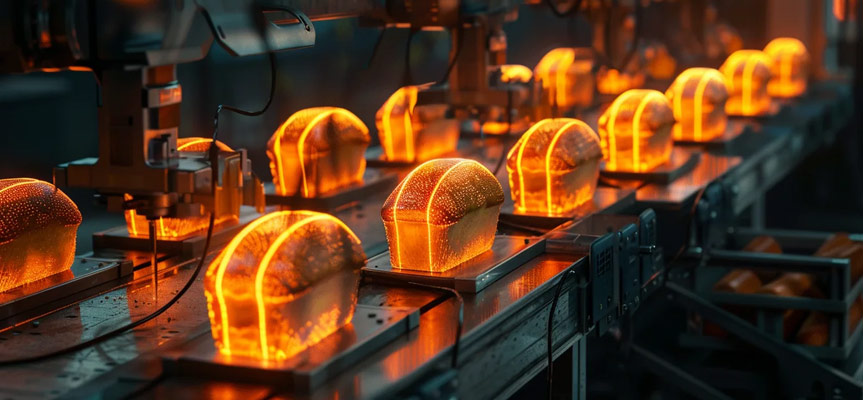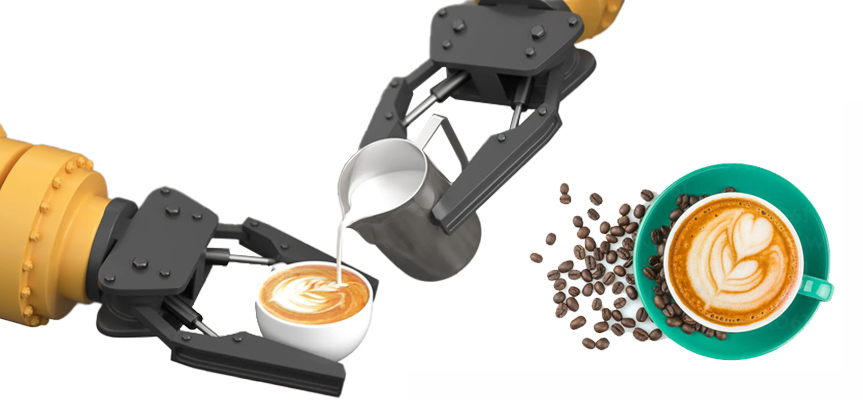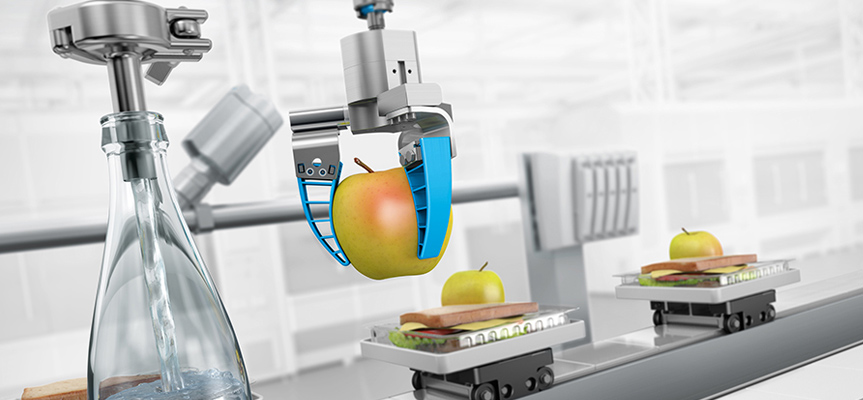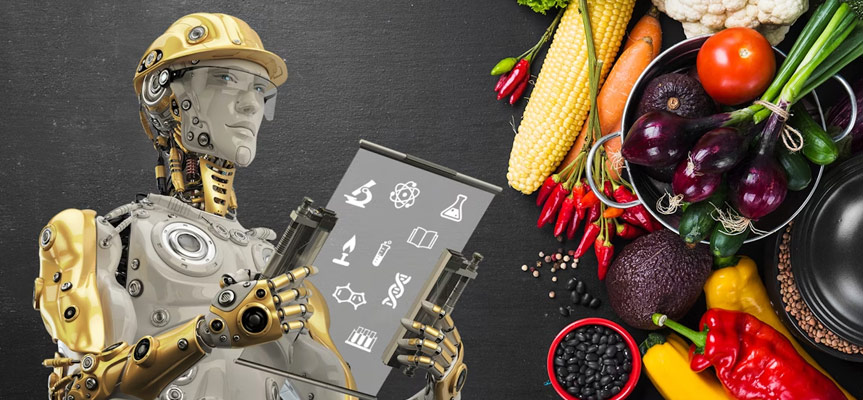Artificial intelligence (AI), advancing at an unprecedented pace, has become one of the most influential technologies shaping various industries. One sector that has deeply benefited from this change is the food and beverage industry. Once reliant on traditional methods and a large human workforce, it is now shifting toward intelligent production, enhanced safety, and cost reduction through algorithms, data analysis, and machine learning.
Machine intelligence is no longer just a laboratory tool or a scientific subject; it plays an effective role in production lines, warehousing, quality control, consumer behavior prediction, and even in creating new food products. This article examines the important and impactful applications of smart technology in the food and beverage industry and shows how this technology can fundamentally change the future of this industry.
Transformation of the Food and Beverage Industry with the Help of Artificial Intelligence
The food and beverage industry is one of the most vital economic sectors in every country. With the increasing global population, the need to produce high-quality, safe, affordable, and sustainable food is felt more than ever. In this context, smart technologies have come to aid this industry by offering intelligent solutions to optimize processes, manage resources, and ensure quality.
Smart technologies, through machine learning and deep learning systems, can identify hidden patterns in production, distribution, and consumption data and provide optimal decisions based on them. From predicting production volumes to reducing waste and even designing smart packaging, all have become possible by leveraging machine learning model algorithms.
Use of Artificial Intelligence in Food Production Lines
The food production line is one of the most complex parts of the industrial production process. At this stage, maintaining quality, speed, accuracy, and adhering to safety standards is of utmost importance. Using intelligent automated systems in the production line enables companies to control these factors with high precision.
For example, cameras equipped with machine vision and deep learning algorithms can evaluate the color, texture, size, and shape of products and detect any deviation from standards. This is critical for the rapid identification of defective or non-consumable materials. Moreover, automated systems analyze production scheduling to increase machinery efficiency and prevent delays in the production line.
Read more: Artificial intelligence and the future of the food industry

Improving Food Quality with Artificial Intelligence
Food quality is a key criterion for maintaining consumer health and the success of food brands. AI can effectively analyze qualitative food characteristics such as taste, texture, aroma, color, and nutritional value. Advanced analytical algorithms help manufacturers quickly identify and correct minor changes in formulation or production processes.
Also, intelligent automated systems can continuously monitor production processes, detect environmental changes like temperature and humidity, and automatically adjust necessary parameters. This results in producing food with uniform quality that complies with global standards.
Data Analysis in the Food Industry
The food and beverage industry generates vast amounts of data at every stage, from production to distribution and sales. Analyzing this data without intelligent automated tools is almost impossible. AI can analyze historical, climatic, consumer, warehousing, sales, and supply chain data to extract valuable patterns.
These analyses not only assist in improving strategic decision-making but also provide accurate forecasts regarding demand, raw material needs, and market behavior. Furthermore, companies can use this information to develop new products or upgrade existing ones.
Application of Artificial Intelligence in Reducing Food Waste
Food waste is a serious global challenge that not only wastes resources but also harms the environment. Intelligent machines can offer effective solutions to reduce waste at various stages from production to consumption.
Learning systems can optimize inventory by analyzing warehousing data, expiration dates, customer behavior, and market demand, preventing product spoilage. Prediction algorithms can also provide precise scheduling for production and distribution to avoid overproduction or shortages.
Food Safety with Artificial Intelligence Technology
Food safety is a major challenge in the food industry. Any contamination or defect in products can have serious consequences for consumer health and brand reputation. Smart technologies contribute to improving food safety by offering innovative solutions.
AI systems can analyze supply chain data to trace the origin of raw materials and detect any potential risks such as microbial contamination. For instance, blockchain-based technologies combined with digital solutions enable tracing raw materials with smart technology, enhancing transparency in the supply chain.
Intelligent Food Production with Advanced Algorithms
Through machine learning systems, AI can regulate the food production process to maximize efficiency while reducing energy and water consumption.
Artificial Intelligence in Beverage Production
The beverage industry has also benefited from AI advancements. AI plays an important role in developing new beverage products. For example, companies can use digital intelligence algorithms to experiment with new beverage formulations and create flavors that match consumer preferences.
Additionally, analytical robots help optimize beverage production processes, from precise fermentation temperature control to quality control of packaging, increasing accuracy and efficiency at every production stage.

Tracing Raw Materials with Machine Intelligence
Tracking raw materials is a vital aspect of the food industry. Today’s consumers demand greater transparency about the origin of products. AI, utilizing technologies like blockchain and machine learning, enables precise tracking of raw materials from farm to table.
This technology not only helps increase consumer trust but also allows companies to quickly identify and address the source of any problem that arises.
The Role of Startups in Transforming the Food Industry
Startups play a significant role in advancing human-simulating technologies in the food industry. These companies, with their agility and creativity, offer innovative solutions to longstanding problems. For example, some startups use these technologies to develop plant-based foods with meat-like taste and texture, meeting the growing demand for sustainable products.
Challenges and Risks of Using Artificial Intelligence
Despite many advantages, applying machine thinking models in the food industry is not without challenges. One of the most important concerns is data privacy. Companies must ensure that customer and supply chain data are securely stored and processed.
Moreover, implementing AI technology requires significant initial investment, which can be challenging for smaller companies. Also, the need for skilled personnel to manage and maintain these systems can hinder widespread adoption of this technology.
Use of Artificial Intelligence in Food Packaging
Packaging plays a crucial role in preserving food quality and safety. Digital intelligence also has extensive applications in this area. For example, AI-based systems can optimize packaging designs to make them more attractive and environmentally sustainable.
Additionally, analytical robots can automate packaging processes and prevent human errors. This is especially useful in mass production, where speed and accuracy are critical.

Predicting Consumer Behavior
In today’s world, where consumers have a wide range of choices, understanding and predicting their behavior is essential for business survival and growth. AI, through big data analysis of purchasing patterns, social media user reviews, and retail information, can identify customer preferences and predict future interests in products or flavors.
This information can be used in new product development, targeted marketing campaigns, and even optimal pricing strategies. Early detection of changes in customer tastes can prevent sales stagnation and product overstocking.
The Future of the Food Industry with Artificial Intelligence: Opportunity or Threat?
Artificial intelligence undoubtedly offers extensive possibilities for the food and beverage industry. However, this technology, while creating opportunities, also brings challenges. On one hand, proper utilization of digital intelligence can lead to cost reduction, quality enhancement, sustainable development, and customer satisfaction. On the other hand, excessive dependence on automated systems and the elimination of traditional jobs can raise concerns in the areas of employment and social justice.
For these machine models to become effective tools, companies need to focus not only on investing in technology but also on employee training, designing ethical policies, and continuously monitoring system performance. In this way, the future of this industry can be smarter, more sustainable, and more humane than ever before.
Conclusion
Artificial intelligence, as a transformative technology, is redefining the food and beverage industry. From smart food production and improving food quality to reducing waste and increasing food safety, this technology has provided countless opportunities for companies and consumers. However, to fully leverage the potential of digital intelligence, companies must manage challenges such as data privacy and implementation costs.
For businesses, startups, and researchers seeking innovation in this industry, now is the right time to invest in new technologies. If you want to learn more about how to benefit from artificial intelligence in your business, consult with experts in the field and explore new opportunities.
If you are a business owner, researcher, or enthusiast of new technologies in the food industries, now is the time to consider intelligent analytical tools as a key component in your strategies.
Frequently Asked Questions
What are the most important applications of artificial intelligence in the food industry?
They include quality control, demand forecasting, waste reduction, new product design, and increasing food safety.
Can machine intelligence reduce food waste?
Yes, by forecasting demand and managing inventory, analytical robots prevent overproduction and food waste.
How does artificial intelligence help food safety?
Smart machines ensure product safety by tracking raw materials and identifying potential hazards such as contamination.
What challenges exist in using machine learning models in the food industry?
Challenges include high initial costs, the need for specialized workforce, and concerns related to data privacy.
What is the future of artificial intelligence in the food and beverage industry?
It is expected that artificial intelligence will lead to personalized food production, kitchen robots, and greater sustainability.

